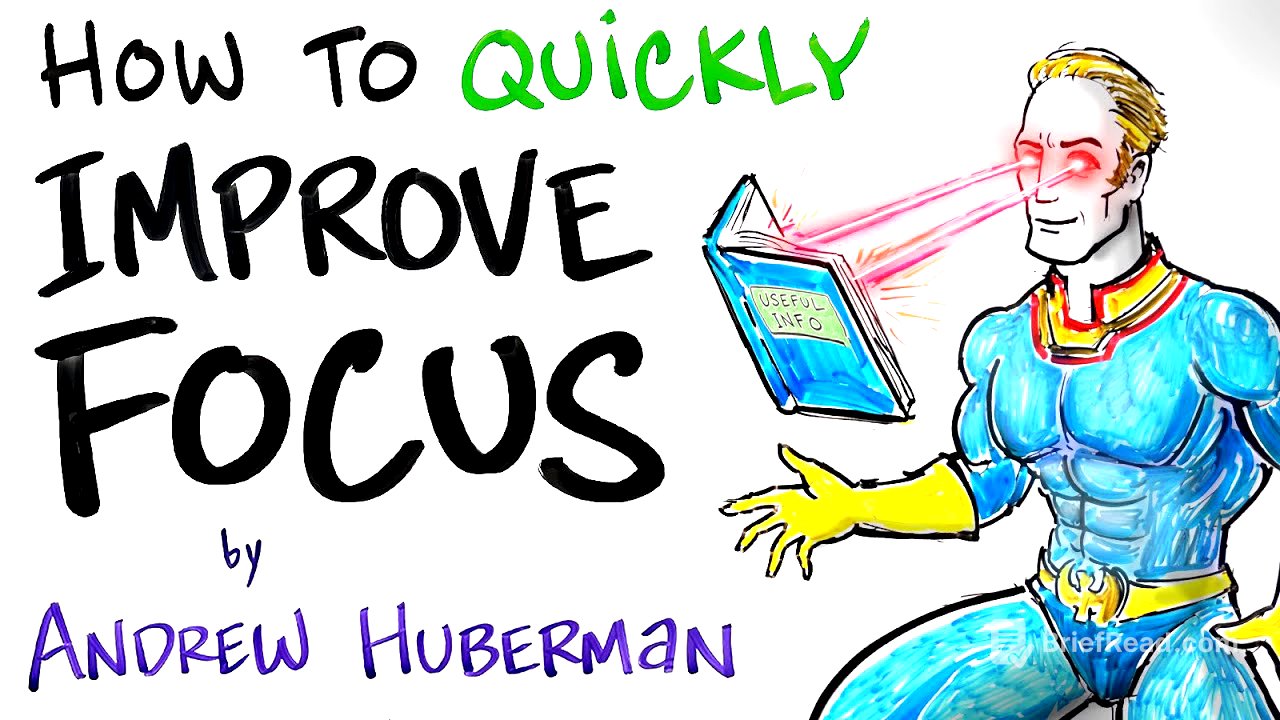TLDR;
This video explains how to improve focus and attention by leveraging the connection between visual and mental focus. It covers the role of alertness, the impact of devices like phones on attention spans, and practical techniques for enhancing focus through visual exercises and managing ultradian cycles.
- Mental focus follows visual focus.
- Alertness is key for plasticity, achievable through various means like caffeine.
- Phones and constant motion stimuli degrade attention spans.
- Practice focusing visual attention to improve mental focus.
- Structure learning around 90-minute ultradian cycles with breaks.
Introduction [0:00]
Andrew Huberman introduces the topic of improving focus and attention by using the mechanisms of focus that we are born with. The key principle is that mental focus follows visual focus. By learning to control and enhance visual focus, individuals can improve their overall mental focus abilities.
The Role of Alertness and Pharmacology [1:03]
Alertness is the foundation for plasticity and can be achieved through various means, including emotions and pharmacology. Caffeine increases epinephrine by reducing adenosine, while Adderall, which is essentially amphetamine, also boosts epinephrine release. However, Adderall primarily increases alertness and is prone to abuse, without directly enhancing the acetylcholine system responsible for focus. Learning on Adderall may not translate to consistent performance.
Visual Focus and Mental Attention [2:44]
The acetylcholine system, crucial for focus, can be accessed through behavioural practices anchored in visual focus. When focusing visually, there's a trade-off between detail and field of view. The eyes align towards a common point, narrowing the visual field and increasing acuity. This visual focus is directly linked to mental focus. Animals like birds use quick, precise eye movements to focus on small objects, activating brain stem neurons that release norepinephrine, epinephrine, and acetylcholine.
Practical Techniques for Improving Focus [6:55]
To improve mental focus, practice focusing the visual system, especially at the distance relevant to the task. For example, focusing on a small window of a screen can enhance visual acuity and brain activity associated with information gathering. Reducing blinking can also help maintain focus by preventing the reset of perception. Closing the eyes can enhance auditory attention, a technique used by individuals with low or no vision to focus their hearing.
The Impact of Modern Devices on Attention [11:57]
Many people develop low-grade ADHD due to constant phone usage. Phones are designed to easily capture attention with their small size and motion-rich content. This makes it harder to focus on less stimulating tasks like reading. Over-reliance on passive, visually stimulating content reduces the brain's engagement of the cholinergic system, which is essential for plasticity. It's important to balance passive consumption with active learning to cultivate a smarter, more emotionally evolved self.
Managing Focus and Ultradian Cycles [15:32]
After achieving alertness and acetylcholine release, the next step is to sustain focus. Learning should occur in 90-minute bouts, aligning with ultradian cycles, including a warm-up period. Eliminate distractions by turning off Wi-Fi and physically removing the phone. When attention drifts, re-anchor it visually to the task at hand. Learning is most effective when alert, so schedule demanding tasks during peak alertness periods.
The Importance of Rest and Deliberate Disengagement [18:31]
Avoid constant maximum focus; incorporate deliberate disengagement like walks or mindless relaxation. Learning occurs best in 90-minute cycles, with the beginning and end being less focused. Recognise these cycles and integrate non-sleep deep rest to accelerate plasticity.









